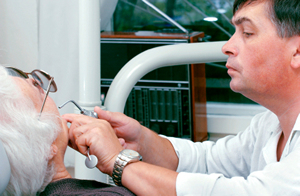
Your annual dental visit is the time not only to get a check-up, but also to bring your dentist up-to-date on any areas of your life that may affect your dental health.
This is also the time to ask questions you may have regarding dental hygiene.
You may be wondering about what type of mouthwash is best or perhaps you want information about the best toothbrush for your oral cavity's shape and size.
What Should I Tell My Dentist?
You should let your dentist know if you have noticed anything unusual about your teeth and gums. Perhaps your gums have been bleeding when you brush them.
This could be a sign of gum disease and your dentist should be made aware of that fact. Typically, problems caught early can be solved inexpensively before they lead up to bigger problems.
It could be that you have noticed a sensitivity to extreme hot or cold. Sores inside your mouth that don't heal or problems with flossing that you've noticed should also be relayed to your dentist.
If you've noticed that you have started clenching or grinding your teeth you should let your dentist know that too, because it can cause your teeth to deteriorate more rapidly due to damaged enamel.
What Else Does He Need to Know?
You should update your dentist with your medical history. Certain medications and conditions can have an adverse effect on your dental health.
Diabetes can affect your teeth and your gums. Some heart conditions can require that you take antibiotics before visiting your dentist to avoid infection.
Always remember that your body is a system and what affects one part of the system can also have an effect on another seemingly unrelated system like your teeth.
Whatever you do, don't forget to contact our office questions if you have any. He'll be more than happy to answer them and develop a dental plan that is right for you.